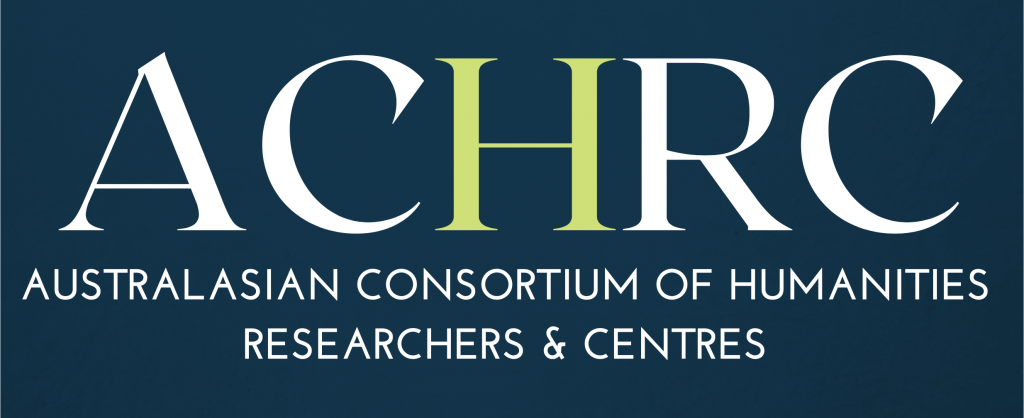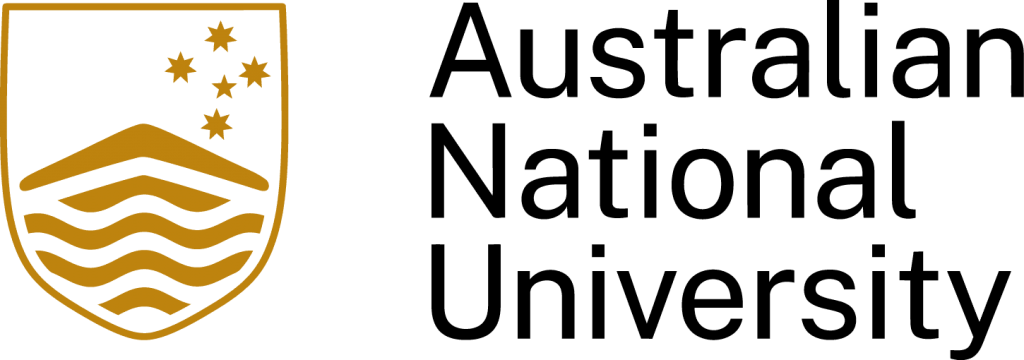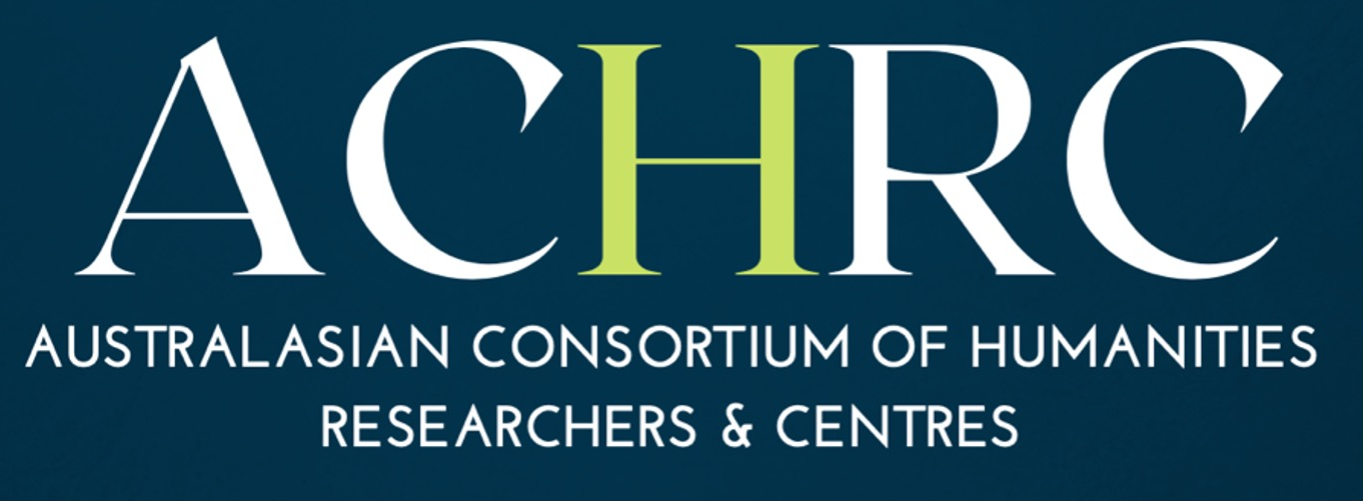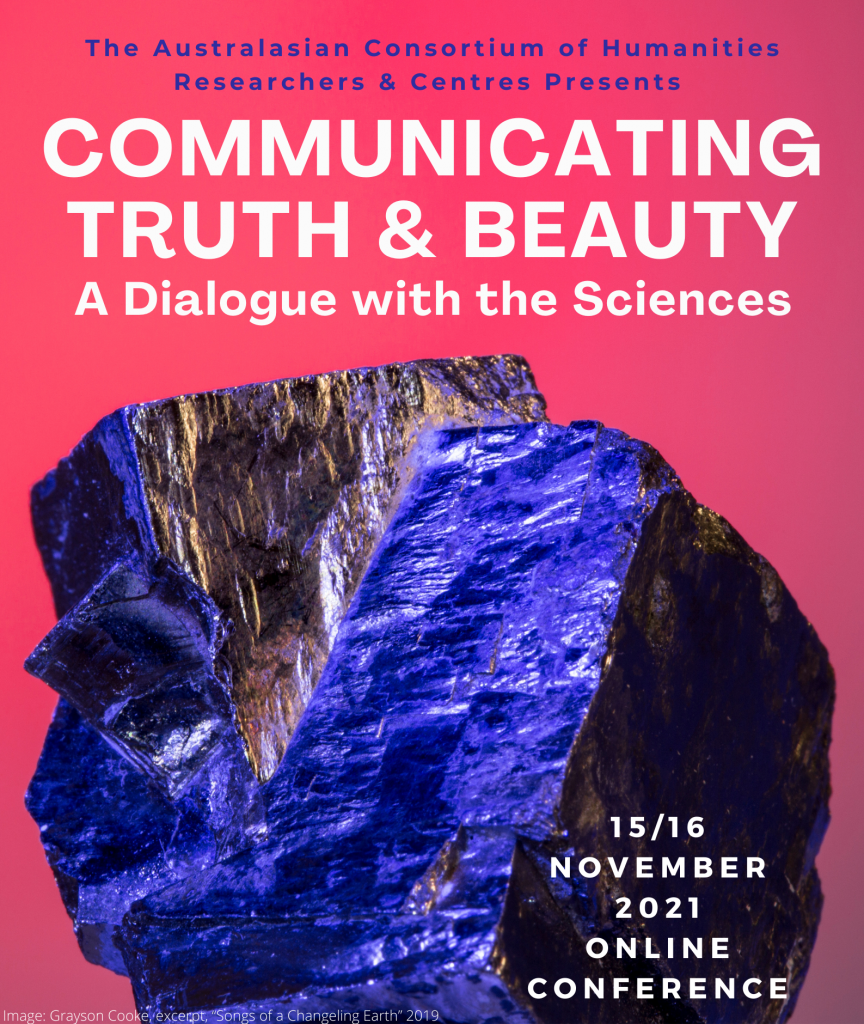
The Australasian Consortium of Humanities Researchers & Centres is pleased to present its 2021 Annual Conference: ‘Communicating Truth and Beauty: A Dialogue with the Sciences’.
The conference will explore disciplinary and institutional relationships both inside and outside the academy, and will feature a number of distinguished scholars from the humanities, creative arts, and sciences on panels and as keynote speakers. The questions our panellists and speakers will be considering include:
-Has the COVID pandemic given us any insight into how the humanities and creative arts might better collaborate with the sciences?
-What can humanists and creatives learn from scientists about communicating their ideas and value to the public at large?
-What is the role of cultural institutions in public culture, and how can the humanities and creative arts contribute to that mission?
We have two keynote presentations on the first day of the conference. The first, given by Emeritus Professor Ian Gibbins, retired Professor of Anatomy at Flinders University and, more recently, an accomplished poet, musician, and artist, and the second by Dr Susannah Eliott, CEO of the Australian Science Media Centre and a leading expert in science communication. You can find bios and abstracts on their keynotes, as well as details on the panels and panellists in the full program link below.
Keynotes
‘The public don’t care about disciplinary boundaries: why we all must work together’
The issue of siloed research disciplines is felt keenly by good science communicators. When approaching communication from a public viewpoint, boundaries are meaningless and can be hugely detrimental. This is especially obvious in controversial areas such as climate change, gene technology and vaccination where we know that simply throwing facts at people does little to change behaviours or allay fears. Only working and communicating across science and humanities disciplines can provide the community with the context and holistic view needed to confront the many challenges that lie ahead of us.
Susannah Eliott is Chief Executive Officer of the Australian Science Media Centre (AusSMC). Susannah helped establish the AusSMC in 2005, a not-for-profit which supports the media in the accurate reporting of science for the benefit of the Australian public. It works with around 1,600 journalists and 5,000 scientists to facilitate the coverage of media stories related to climate, energy, natural disaster, health, technology, diet, and space. She has more than 25 years’ experience in science communication.
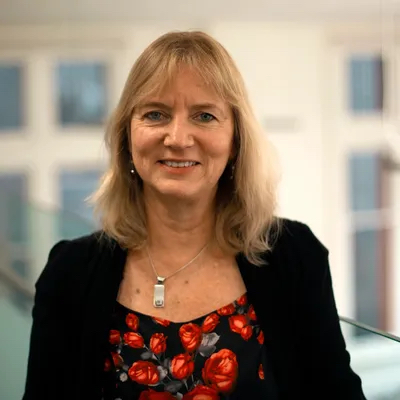
‘Uncountable Cultures: Science, Art and the Limits of Knowing’
Despite the on-going currency of the notion of “the two cultures” as famously expounded by CP Snow, the last twenty years in particular have seen the widespread growth of fruitful collaborations between artists and scientists along with increasing support for individual artist-scientists. Indeed, the creative processes of many successful artists and scientists have much in common: at very least, the ability to enjoy working with uncertainty and risk in uncharted territories; a dedication to evolving craft and technique; an understanding the contextual history of the problem at hand including the recognition of the contributions of peers, predecessors and collaborators. All areas of expertise have their specialised cultural domains: language, concepts, procedures, and more. In this sense, any productive collaboration is cross-cultural in some way. Throughout my career in science, beginning in zoology and ending up in neuroscience and functional anatomy via pharmacology, physiology and advanced microscopy, I maintained, to fluctuating degrees, my practice in language, literature, music and visual arts. The many and varied interactions between these domains have been unpredictable yet ultimately productive for my science and art alike. During this talk, I will expand on these ideas, illustrated by my own work together with that of my collaborators and colleagues around the world.
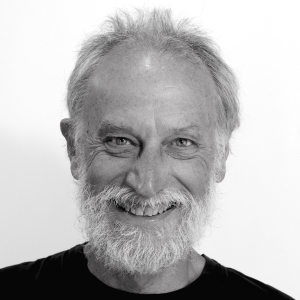
Ian Gibbins is a widely published and exhibited poet, video artist and electronic musician living on unceded Kaurna land in South Australia. His video poetry, video art, and soundscapes have been shown to acclaim at festivals, public art installations and galleries around the world. He has published four books of poetry as well as diverse forms of visual poetry, interactive web-based poetry, and poetry in artificial languages. Before he retired in 2014, Ian was an internationally recognised neuroscientist and Professor of Anatomy at Flinders University, South Australia. For details of Ian’s creative work, visit www.iangibbins.com.au.
Panels and panellists
Panel 1 – Conversations Across the Creek
Em Prof Will Christie, Director ACHRC
Prof Alex Zafiroglu, Professor of Cybernetics, ANU 3A Institute
Dr Paul Hardisty, CEO, Australian Institute of Marine Science
Panel 2 – What the Humanities and Creative Arts can learn from Science communication
Prof Robert Phiddian, Professor of English, Flinders
Dr Rod Lamberts, Deputy Director, Australian National Centre for the Public Awareness of Science
Ms Suzy Freeman-Greene, Editor at The Conversation
Panel 3 – Creative Arts Engagements with Science and Science Infrastructure
Assoc Prof Grayson Cooke, Creative Arts Chair, Southern Cross University
Assoc Prof Alice Gorman, Space Archaeologist, Flinders
Dr Erica Seccombe, School of Art and Design, ANU
Mr Steven Petkovski, National Mineral and Fossil Collection, Geoscience Australia
Panel 4 – Working with Peak Bodies
Prof Bronwen Neil, Past Executive Director Humanities and Creative Arts, Australian Research Council (ARC)
Dr Tina Parolin, Executive Director, Australian Academy of Humanities (AAH)
Prof Dan Woodman, Director, Council for the Humanities, Arts and Social Sciences (CHASS)
Prof Cynthia White, Convenor of Humanities, Marsden Fund (Royal Society of New Zealand)
Panel 5 – Humanities, Creative Arts, and the GLAM sector
Dr Tully Barnett, English, Flinders
Prof Craig Batty, Dean of Research, UniSA Creative
Distinguished Prof Jen Webb, Dean of Graduate Research, University of Canberra
Dr Marie-Louise Ayres, Director-General, National Library of Australia
